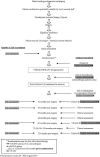SPIRIT-PRO Extension explanation and elaboration: guidelines for inclusion of patient-reported outcomes in protocols of clinical trials
- PMID: 34193486
- PMCID: PMC8246371
- DOI: 10.1136/bmjopen-2020-045105
SPIRIT-PRO Extension explanation and elaboration: guidelines for inclusion of patient-reported outcomes in protocols of clinical trials
Abstract
Patient-reported outcomes (PROs) are used in clinical trials to provide valuable evidence on the impact of disease and treatment on patients' symptoms, function and quality of life. High-quality PRO data from trials can inform shared decision-making, regulatory and economic analyses and health policy. Recent evidence suggests the PRO content of past trial protocols was often incomplete or unclear, leading to research waste. To address this issue, international, consensus-based, PRO-specific guidelines were developed: the Standard Protocol Items: Recommendations for Interventional Trials (SPIRIT)-PRO Extension. The SPIRIT-PRO Extension is a 16-item checklist which aims to improve the content and quality of aspects of clinical trial protocols relating to PRO data collection to minimise research waste, and ultimately better inform patient-centred care. This SPIRIT-PRO explanation and elaboration (E&E) paper provides information to promote understanding and facilitate uptake of the recommended checklist items, including a comprehensive protocol template. For each SPIRIT-PRO item, we provide a detailed description, one or more examples from existing trial protocols and supporting empirical evidence of the item's importance. We recommend this paper and protocol template be used alongside the SPIRIT 2013 and SPIRIT-PRO Extension paper to optimise the transparent development and review of trial protocols with PROs.
Keywords: clinical trials; education & training (see medical education & training); protocols & guidelines; statistics & research methods.
© Author(s) (or their employer(s)) 2021. Re-use permitted under CC BY-NC. No commercial re-use. See rights and permissions. Published by BMJ.
Conflict of interest statement
Competing interests: All authors have completed and submitted the ICMJE Form for Disclosure of Potential Conflicts of Interest and declare: SPIRIT-PRO group members were reimbursed for travel/subsistence at the consensus meeting. MC is Director of the Birmingham Health Partners Centre for Regulatory Science and Innovation, Director of the Centre for the Centre for Patient Reported Outcomes Research and is a National Institute for Health Research (NIHR) Senior Investigator. MC has received personal fees from Astellas, Takeda, Merck, Daiichi Sankyo, Glaukos, GSK and the Patient-Centred Outcomes Research Institute (PCORI) outside the submitted work. RM-B reports non-financial support from University of Birmingham. OA, DK and ARet report grants from NIHR. OA and DK report grants from Birmingham Biomedical Research Centre (BRC). OA reports grants from UCB Pharma and also receives funding from the Health Foundation and declares personal fees from Gilead Sciences Ltd. DK and ARet report grants from Innovate UK and Macmillan Cancer Support. DK reports grants from Kidney Research UK, NIHR SRMRC at the University of Birmingham and University Hospitals Birmingham NHS Foundation Trust, personal fees from Merck, GSK. EB declares personal fees from Navigating Cancer, Sivan Healthcare, CareVive Systems and AstraZeneca. Bell reports other from AstraZeneca, is an employee with stock ownership and/or stock options in the company. JCC reports other from Pfizer Inc., and is an employee and a stockholder of Pfizer Inc. IG is a fully paid employee of Boehringer Ingelheim International GmbH. CE is Chair of the Government of Canada Interagency Advisory Panel on Research Ethics. LM reports non-financial support from Daiichi-Sankyo and Cell & Gene Therapy Catapult. Morel reports other from UCB. LN reports other from GlaxoSmithKline, including employment and ownership of stock in GSK. RS reports personal fees from BioMed Central and Pfizer, other from NHS England, NHSx, NDC, NCRI, NIHR, MRC CTU, GeL, Glasgow CTU, UCLH, LSHTM, Cancer Research UK, Macmillan, Warwick University, Warwick CTU and University of Birmingham. AW reports grants from NIHR and Innovate UK. All other authors have completed the ICMJE uniform disclosure form and declare no support from any organisation for the submitted work; no financial relationships with any organisations that might have an interest in the submitted work in the previous 3 years, no other relationships or activities that could appear to have influenced the submitted work.
Figures





